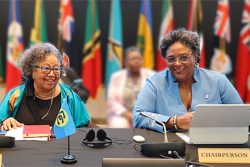It’s a community that is just a couple miles away from modern amenities like mobile communication, internet access and television networks, yet the town of Ituni, 36 miles from Linden, remains far removed from such basics of modern community living.
Lamenting the state of the community, businessman Cedric Murphy described it as, “down to earth… it is a community that needs a lot of development.”
Stabroek News visited the former bauxite mining district last week and spoke with the residents.
Murphy said, “we live in hell,” explaining that Ituni receives eight hours per day of electricity (6pm-2am), and untreated creek water provided by the Guyana Water Authority (GWI) that comes sometimes for just one hour in the morning. And residents must dig a hole in the sand and position a container to catch the water because the water pressure is so low. Now that the dry season is on, some residents in this community of 1,500 are forced to travel miles for water to drink.
Apart from a small number in the community the large majority of persons cannot access the national radio station and have to contend with foreign news from Trinidad and Tobago or some other country.
In the bauxite heyday of DEMBA (Demerara Bauxite Company) the then mining community of Ituni enjoyed a full supply of electricity and water and for decades had provided much-needed revenues for the country.
DVD culture
To counteract the absence of television networks, the community has developed a DVD culture. Librarian Onica Murphy told this newspaper that she buys an average of four DVDs per week for $1,000 for her family of four. As a result, today’s news is also yesterday’s news because there is no daily supply of newspapers, that is, until a minibus brings a copy in the evenings.
Murphy also told Stabroek News that because of a lack of television channels he has installed Direc TV at an initial cost of $200,000 and pays $12,760 VAT inclusive per month. This businessman is among a few residents with satellite television service, but he regrets that it is sometimes a struggle to pay for the service during periods of low sales.
Internet access in the community is restricted to a few homes and there is no internet cafe or hotspot that the public can access.
Resident Devon Mars lamented that Kwakwani and Aroaima, communities a short distance away from Ituni, enjoy this service in addition to cellular coverage, but not Ituni.
Joining this cry was small business owner Junior Fraser who explained that if the landline cable at anytime should be disrupted there is no other means for the community to communicate outside its boundaries.
No ice-cream for kids
Meantime, the majority of the residents without landline are forced to pay $100 to use their neighbour’s landline with their phone card.
Stabroek News saw no visible payphone kiosk in the community. And summing up the sad social state the community is in, according to one man, “for children to know what ice-cream is, you have to take them to Linden.”
Melron George, former chairperson of the Community Development Council (CDC), agreed that the community is in need of a lot of development but noted, “we are being marginalized… (at) all different levels.”
No CXC offered
George, a graduate teacher at the Howell Wilson Community High School, in answering why the community has no functioning CDC, in light of the serious social needs there, noted that the members of the body had relieved themselves of their posts on the council, citing conflict of interest. Stabroek News was told that council members would shy away from voting for sanctions against members of the community they shared relations with. Currently, there is a Community Development Officer (CDO) based in Linden who is attached to Ituni, but this newspaper understands that this individual does not regularly conduct visits.
George would like to see the community being given Neighbourhood Democratic Council (NDC) status, and has petitioned the government for such a move since 1997. With this status, he noted, the community will be able to have more administrative power and can bargain for a lot more things that are needed. For example, this teacher would like to see CXC being offered at the Community High so that students can remain in the community to complete their secondary education.
However, students who leave the community to pursue secondary education in Linden often have to return to Ituni because of a lack of boarding accommodation. George also noted that CXC is being offered at Kwakwani.
He put the attendance at the school at over 70%, adding that the economic situation in the community prevented some children from attending classes.
Logging
George concurred that there is “no base for economic activities outside logging.” He also remarked that apart from the few public servants in the community who receive a salary, “outside of that it is a struggle.” This teacher would like to see opportunities being created for youths to get jobs. For example, this former CDC chairperson would like to see Ituni obtain a production facility to dress wood and process lumber.
Last year an abandoned dragline in the community was sold and the monies from that sale were promised towards community development. To date the residents have not been able to access that sum. George told this newspaper that based on information from the Linmine Secretariat the sum from the dragline sale is some $4.5M, but before the community can access the monies, a plan must be submitted on how these monies will be utilized. He said that a number of persons were delegated responsibilities to work out a plan and one should be ready by mid-April. It is his view that because the community is “so dislocated economically” and not because of a lack of interest the plan has not yet been formulated.
Once the plan is put forward and the sums are in hand, it is hoped that the monies will go toward sports equipment, a computer for the library and for the school with internet access and a satellite television dish.
He also firmly believes that since the Ituni road leads to Kwakwani and Aroaima, the resources the government receives from the use of the road should be used to upgrade the road and enhance social development in the area.










